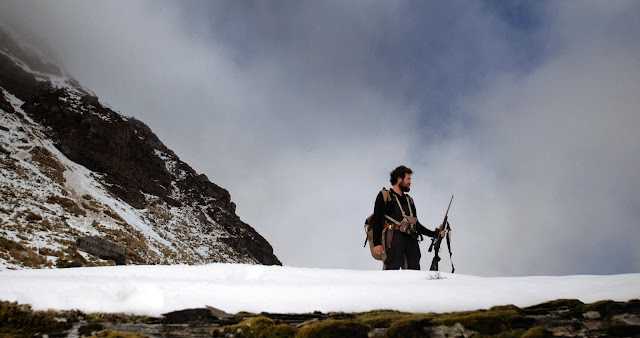Meat: Film Review
Director: David White
David White’s lovingly shot documentary purports to be the modern story of the animals we eat.
But what emerges from this 75 minute amble through bucolic life, is an often philosophical look at life on the farm and in the hills, with differing points of view on why their chosen lifestyle’s the best.
Covering four different meat producers, from a hunter who kills and eats his own, a retiree who is a chicken farmer, a pig farmer who’s produced around 400 tonnes of pork a year and a one-woman farmer, this is an amiable look at what goes into creating the food chain that New Zealand’s been so famous for at times.
And while White’s got an eye for the perfectly beautiful shots (it’s no surprise to find he’s grown up on a farm), be it rows of chickens in the farm or a drone shot of pigs being carted off to the abattoir that makes them look like packed sausages on the back of a truck, the doco’s desire to be provocative and make people think about where their meat comes from never quite scratches below the surface.
Part of the philosophy of the film is clearly to educate, and perhaps, it’s a reflection on current society that many grow up not knowing where the food they eat comes from or how it’s produced. Certainly those who’ve had a modicum of education and are a bit wiser (and maybe a generation older) will find nothing new in this, which plays like an extended episode of TV long-stay Country Calendar.
Although, perhaps, that’s part of the film’s raison d’etre, what emerges more as the film goes through its 75 minutes cycle, are the philosophies of those who till the land and rear the creatures.
With a choice of four fairly similar characters, it’s in the subtleties that Meat beats its own drum as it casts an eye into the world within and the attitudes of the farmers.
This is no hard-hitting expose of farming practices, and does, for the large part, feel like an extended advertorial for the Meat sector, with the various particpiants extolling the virtues of their varying practices and in Ian, the pig farmer, refuting some of the claims levelled against their industry. Certainly, for those fearing a full-on trip to the abattoir, complete with screeching animals as the death blow rains down, Meat doesn’t deliver the goods.
It’s a sensitive piece that handles deftly (or perhaps too tentatively and lightly) the final process of the chain – it’s only the chickens whose fates are shown to the camera as White interviews one of those who’s made it their livelihood to kill for a living. There will, however, be some who feel the view of a pig being killed and kicking and twitching as it dies may be a step too far, but in all honesty, White simply lets the camera capture the reality of what happens on a farm – and if you’re going to educate, you can’t hold back. Though, equally, claims can be levelled against the doco for not presenting a fuller picture of what happens once the meat moves on.
That said, as ever with New Zealand’s docos, it’s the characters within that stand out once the cameras are turned on.
From Tony, the chicken farmer who only hires retirees because they won’t go anywhere (and who, in one of the more wryly Kiwi iconoclastic moments by our film-makers, has a group of people shown on screen and titled Ian’s Death Squad to much amusement) to Josh the hunter who’s determined to pass on his practices but whose hunt is him alone, it feels like there are moments that could have been explored further and a little deeper.
That said, there’s a humanity on show here that’s showcased in the intricacy of the connections within and the worlds that collide. From espousing different philosophies on their respective places within the food chain or in the pig farmer’s case, railing against the perceptions of their industry, White’s gone to great lengths to ensure that everyone’s got their moment in the spotlight.
But there’s a nagging sense of doubt that a bit more could have helped Meat in its post-film discussion.
Whether it’s talking to the families about the decisions made or the stresses placed on others, there’s a very real feeling at times that the movie’s been slightly missing some elements for mass consumption and while that’s not a major mark against it, it does leave you with the belief that Meat is not quite the full platter you’d have expected.

